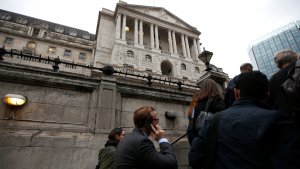The UK’s dramatic shift toward self-employment could be storing up long-term retirement problems for the future, according to a report by the Federation of Small Businesses (FSB).
Alarm Over Self-Employment Savings 'Time Bomb'
The UK’s dramatic shift toward self-employment could be storing up long-term retirement problems for the future, according to a report by the Federation of Small Businesses (FSB).

It found less than a third of self-employed people are saving with a private pension, while 15% said they do not have retirement savings of any kind. More than a quarter (27%) plan to rely on their business to fund their retirement, but with many self-employed earning a low income this won't be a viable solution for all, said the group.
The FSB is urging ministers to work towards a savings solution for the self-employed, who are not covered by automatic enrolment - the government programme which encourages employees into workplace pensions saving.
Mike Cherry, the group's national chairman, said: “Policy makers have been slow to respond to the boom in self-employment and are therefore playing catch up. If we do not act now to adapt to this changing workforce, we will only be shoring up problems for the future.
“In a whole range of areas, the self-employed are akin to round pegs in a system built of square holes. Their ways of working don’t fit with the support frameworks in place. Many are being shut out of financial services like mortgages or personal insurance because they don’t fit the usual mould. More must be done to support these workforce pioneers.”
FSB was set up in 1974 as ‘The National Federation of the Self-Employed and Small Businesses’ to help promote and protect the self-employed sector.
It's report found big benefits to becoming your own boss. More than 15% of the UK workforce has decided to make the move. Self-employment is now at the highest level in 40 years, up from 12% of the workforce in 2000 and 8% in 1980.
Opportunities and threats
The biggest benefits listed by the 1,600 self-employed people involved in the study were freedom and independence at work, a better work-life balance, and the chance to fulfil a personal vision.
But the self-employed face many challenges too, including uncertainty over income, lack of a safety net if they fall ill or have to take time off, and the need to constantly secure new business.
Among the key recommendations made by FSB in the report are measures to improve the safety net for the self-employed who miss out on many benefits employees take for granted.
This includes increasing the Maternity Allowance so it is in line with the more generous Statutory Maternity Pay, as well as working with the insurance industry to develop more affordable income protection insurance products for the self-employed.
It is also calling on the government to establish a statutory definition of self-employment in order to provide legal certainty for the millions of individuals who are legitimately self-employed - the vast majority of those who go it alone.
The move would also help to protect workers from 'bogus self-employment', whereby employers use self-employed contracts to avoid paying National Insurance Contributions (NICs) or observing employment rights.
The report uncovered significant pay diversity in the self-employed population. A third of self-employed people claimed to be earning more than £2,000 per month, but 41% said they took home under £1,000 and 19% said it was less than £500 a month.
Six in 10 said they had experienced extended periods, of at least two weeks or more, where they earned nothing at all.
Thanks for signing up to Minutehack alerts.
Brilliant editorials heading your way soon.
Okay, Thanks!


